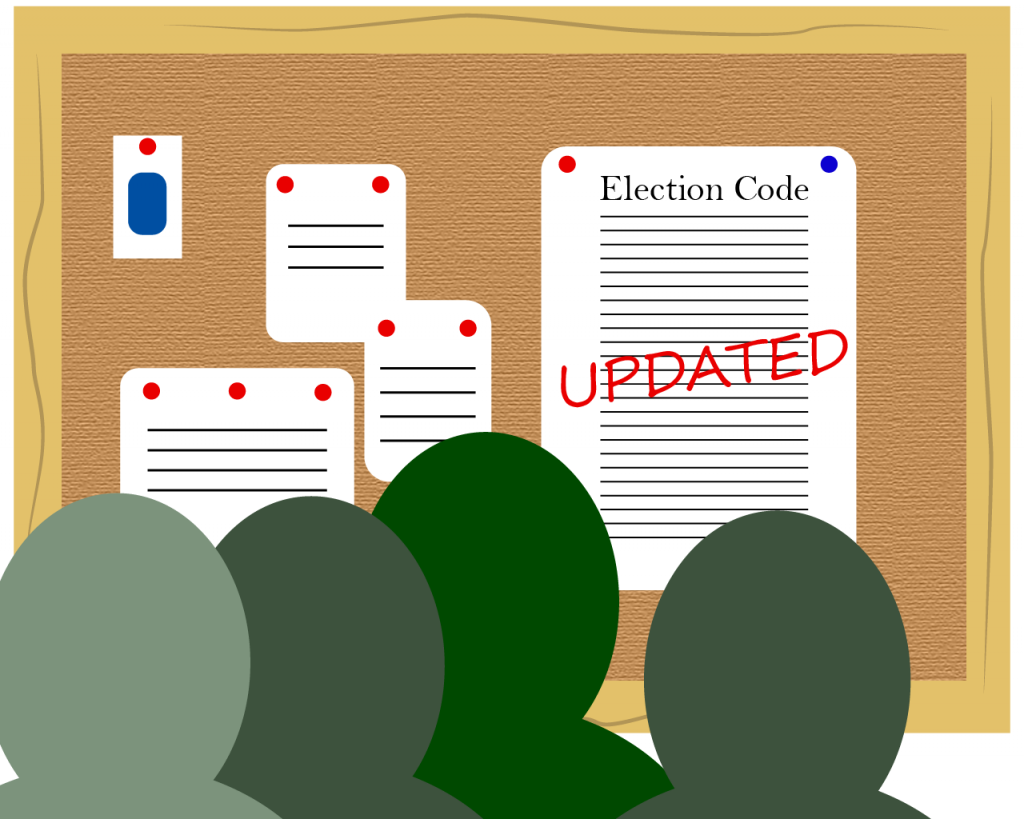The Student Association (SA) is cracking down on election violations in preparation for the upcoming spring 2022 vote for E-Board and the Binghamton University Council representative.
In a meeting on Tuesday night, the SA Elections and Judiciary Committee presented its draft of new codes, which are expected to be voted on in a special Zoom session next week.
This spring, the SA elections were moved fully online for the first time due to the COVID-19 pandemic. The elections were hosted on B-Engaged, the University’s online platform which is commonly used for organizing campus-affiliated groups and events for undergraduate students.
The use of B-Engaged was met with opposition from the Graduate Student Organization (GSO), considering some positions are voted on by both undergraduate as well as graduate students. Specifically, the election of the student BU Council representative came under scrutiny. The BU Council representative is chosen by the student body to work alongside nine other state-appointed administrators to oversee certain University operations, such as reviewing budget requests and reviewing plans for on-campus infrastructure programs.
Members of some student organizations claimed that the SA made fundamental changes to the voting process without fully explaining them to voters in a way that could be easily understood, and a lack of independent oversight resulted in numerous conflicts of interest.
As reported in a March 2021 Pipe Dream article published after the 2021-2022 SA E-Board elections, Michael Messina, ‘20, former Asian Student Union senior adviser, suggested the SA create an independent elections committee.
“The solution to such institutional issues is simple: an independent elections commission,” Messina said. “Anyone would say that having election candidates in charge of their own election committee, which was the case here considering [SA Congress Speaker Ross Mesnick], who has run in the election, also appoints the election committee head.”
During Tuesday’s meeting, SA Elections and Judiciary Chair Alexandria Chun, a sophomore majoring in philosophy, politics and law, emphasized the importance of yearly review and change to the election process.
“The elections code should change every year, to reflect any [incidents] that may have happened in the past year, to mitigate those issues before they might arise again,” Chun said.
The change in the codes included the addition of a penalties document, which clearly outlines campaign rules and punishments for potential violations.
Examples of such rules include the prohibition of mass emails, joint campaigning, improper use of social media and voting day electioneering. Depending on the violation, candidates may be removed from certain aspects of campaigning or disqualified altogether.
Chun expressed confidence in the integrity of online elections going forward.
“Our election will have an online ballot as it is more reliable and efficient,” Chun wrote in an email. “I don’t believe [an independent elections commission] is necessary considering there is already oversight from the E-Board and other members of the SA.”
To this end, the draft included special articles to address policies regarding contested elections, specifically as it pertains to allegations of mishandling by the SA.
“If there is evidence of widespread faulty administration of the election by the Elections and Judiciary Committee that may have done substantial and material harm to the election, and may have contributed to compromised election results, an application must be submitted to the Judicial Board with all evidence and violations,” Article 2, Section 10 of the proposed election codes read. “A notification must also be sent to the chair of the Elections and Judiciary Committee.”
During the meeting, SA Elections and Judiciary Committee Vice Chair Samil Levin, a sophomore majoring in economics, said he believes this is a bold yet necessary step to quell the concerns raised last year.
“We’ve become familiar with the circumstances of last year’s election, these are really extreme measures,” Levin said. “This is also to keep us, the Elections [and Judiciary] Committee, in check, because … if a candidate truly believes that our handling of the election was so bad, it gives you [the candidate] that ability [to protest]. These are extraordinary measures.”
SA President David Hatami, a senior double-majoring in political science and business administration, voiced his confidence in the new election codes.
“Our new Elections Code this year is designed to mitigate some of the issues we saw in last year’s election, which includes numerous instances of miscommunication, unusual interpretations of SA governing documents and issues relating to day-of-election campaigning and candidate promotions,” Hatami wrote in an email. “We are confident that this year’s code includes the necessary stipulations needed to prevent any election-time mishaps. We encourage the student[s] to review our new Code, which if passed, will be publicly available on the SA website.”
Hatami defended the SA’s Elections and Judiciary Committee’s ability to handle elections in a proper and fair manner.
“At its foundation, the SA Elections and Judiciary Committee is designed to act as a nonpartisan, independent entity; and in recent history, they have been able to execute their job in an efficient and appropriate manner,” Hatami wrote. “The SA is designed to have controls in place for [members] overstepping their designated powers and responsibilities, such as the checks and balancing powers of the SA Congress and [Judicial] Board.”
Hatami also referenced the importance of student involvement in the process.
“I have full confidence in our fellow student leaders’ abilities to facilitate a smooth, free and transparent election this year,” Hatami wrote. “However, we are always open to student input, and would be interested in hearing what students have to say about this notion.”
Following a vote at the meeting, the spring 2022 E-Board and BU Council representative elections are set to be held online from 8 a.m. to 8 p.m. on March 9.



